Matt Moore's Blog, page 9
May 20, 2014
A Case for Publishers To Provide Contributors’ Copies
When I publish work in a magazine or anthology, I love getting my contributor copy. But more and more, publishers are sending PDFs of the work and offering authors a discount on the physical copies. Depending on the market, the cost to buy and have the book shipped might exceed the payment the author received.
I understand that shipping costs are killer these days. Even shipping from the U.S. to Canada, or vice versa, can be double or triple the cost of intra-country shipping. To say nothing of shipping overseas.
But there are benefits to shipping contributors’ copies to authors. While it’s hard to put a financial number on these, sending contributor copies is free publicity. I’m not going to go so far as to say it’s about “exposure” (since trying to tell authors they should be grateful for exposure is a bunch of crap), it does come down to reach, word-of-mouth and critical mass. More than that, it builds relationships between authors and publishers.
Bring the book to readings and show it off
When I am doing a reading, I will bring a physical book with me to show the audience. I name the title, and talk about the publisher and theme. After the reading, more often than not I’m asked about the anthology or the publisher.
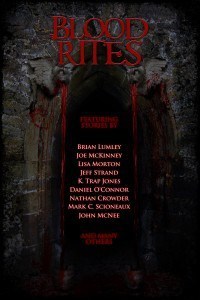
After reading a story from Blood Rites, an attendee wanted to know if it was available in the dealers room.
And since I tend to read samples from several stories, I will show off a couple of books. If I don’t have the book, I’m less likely to read the story from it.
Once, when I finished reading “The Leaving” from Blood Bound Books’ Blood Rites at a convention, someone in the audience asked if Blood Rites was available in the dealers’ room. Unfortunately it wasn’t, but had it been there would have been a sale. But I can’t help but wonder if that person went home and ordered it.
Promote the book as soon as it arrives
When I receive my copy, I take a picture and post it all over social media. I brag about it. I thank the editors and publishers. I would do the same when the magazine or book hits the shelves, but images get a lot more attention than a text post. And a personal picture will make people stop and look more than the standard cover image pulled off Amazon.
Does it result in more sales? Hard to say. But the more eyeballs get on a product is more potential buyers. And the odds are one of them will buy.
Keep it someplace special and lend it out
I have a book shelf for books and magazines containing stories of mine. I show it off to visitors. I use it as a background when I do (the rare) video blog post. From time to time, I loan these books out to people to read. Sometimes I have to ask a few times to get the book back.
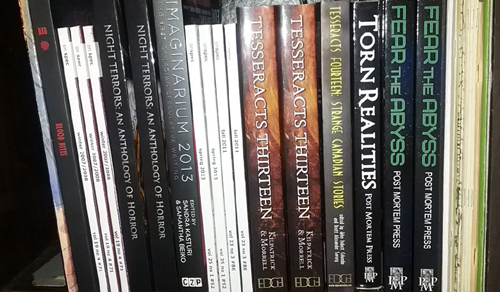
My book shelf with some of the magazines and anthologies I’ve been published in.
Build stronger ties between publisher and authors
When I received my contributor copy of Torn Realities (Post Mortem Press), they had put a bookmark into the book marking my story. That was a classy move. I was impressed and now consider PMP one of my top-of-mind publishers.
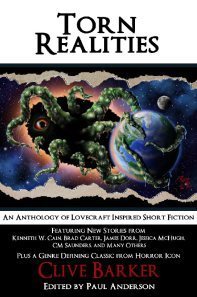
When my copy of Torn Realities arrived, a bookmark had been inserted marking my story “Delta Pi”
When Blood Bound Books told me shipping my copy of Blood Rites to Canada would be expensive, I volunteered to pick it up from them in a few months at the World Horror Convention in New Orleans since we were both attending. No sooner had I entered the dealers room did Marc Ciccarone, owner and editor of BBB, spring up from his table and hand me my copy. I was impressed and look forward to working with Marc some more.
While there are other publishers that might pay more, I know that Marc and Eric Beebe (from PMP) are good guys who will be straight with me. I’m not going to get rich through this, so I’d rather work with people who don’t treat authors as commodities. When they set word counts and deadlines, I am both professionally and personally motivated to hit them, which makes their lives easier.
So, do you agree contributor copies are important?
Taken all together, how much a publisher would pay for the reach I am trying to give them is greater than the cost of shipping a book. In the end, though, it is a financial decision, but no one is going to get rich writing short fiction. I’d rather take a lower pay rate and receive a contributor copy. I hope publishers out there agree with me.
Have I missed something? Let me know your ideas in the comments below. Or, would you rather have the money in your pocket and don’t need a contributor copy?


May 3, 2014
Viewing Fandom as an Underground Economy of Ideas
The Ottawa Comiccon is coming up next weekend. In all likelihood, I will be attending and helping out at the ChiZine Publications table (#2418 – come by and say!). With it, I have been thinking about fandom.
A few months back, I was contacted by a student writing a paper on fandom who had seen my #SixSeaonsAndAMovie post. She asked if she could ask me some questions and when I said “yes”, she replied:
The particular report I’m writing is in response to the Henry Jenkins definition of “fan culture”:
‘[A] culture that is produced by fans and other amateurs for circulation through an underground economy and that draws much of its content from the commercial culture’.
My initial response is that this definition seems to neglect underlying social and political issues between the producer and fans of any given text, so I’m looking for fans who wouldn’t mind sharing their own thoughts on how class and social experiences may influence one’s viewing or appropriation of the text. What I really appreciate about your blog is that you discuss feelings towards the show and yourself almost as (so to speak) an ‘underground economy’ – as though the only thing a fan of Community should be concerned with is recognising and sharing a sense of self-reflection.
Really I think what I’m trying to ask is – as a fan of Community, and on that particular blog post, do you exchange knowledge about the text almost as an ‘underground economy’ or ‘commercial culture’, or do you share your personal appropriation of the text. If you do indeed share rather than exchange, could you explain some of the possible social, political or personal reasons as to why you enjoy sharing your fandom?
This gave me quite a bit to think about. I did some quick research on Dr. Jenkins, found there was too much for me to do a quick search, and so turned to the question at hand. My reply is below:
I’ll start with the statement about “fan culture” being “‘[A] culture that is produced by fans and other amateurs for circulation through an underground economy and that draws much of its content from the commercial culture’.” I think a lot of this is right, but will zero on on ” underground economy”. The term “economy” can be defined narrowly or broadly, but in general it is a system of exchange relying on limited resources and exchanges that hopefully benefit both parties, where the items of exchange can be further exchanged.
One can certainly see this economy at work at just about any fan convention. Vendors will be selling T-shirts, artwork, blankets or any number of items that use unlicensed likeness of others’ creative work. (Right now, I am drinking a cocktail from a tumbler with the Decepticon logo etched into it. I doubt it is licensed by Hasbro.)
But as you say, I think this narrow definition excludes a significant part of what I would consider “fan culture”. Cosplay, fanfic, animated GIFs, fan films—there are a number of expressions of fandom that do not expect or work on monetary reward. Rather, a fan has such appreciation of a franchise that the only way they know how to deal with it is to immerse themselves in it. There is no exchange or profit here other than in meeting others with the same enjoyment and passion as you.
There is also, as you have pointed out, the interaction between creator and fan that the Internet has made much more intimate and immediate. Kevin Smith stands as one example of a creator who understands and interacts with his fans, both in person and online. It’s a great way to recognize that without fans, there is no celebrity/culture creator. One might say there is an economic interest in connecting with fans, but I doubt the most plugged-in creators do it to increase their profit. Rather, they enjoy that others enjoy their work.
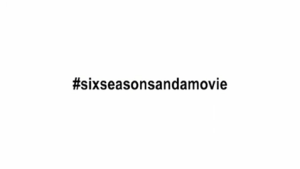
The closing show of the season three finale of Community. For me, it was a call to action that I and many others took, resulting in #sixseasonsandamovie trending worldwide.
Which leads to my post, which was simply an expression of my feelings at the time. The decision to put #sixseasonsandamovie as the closing shot of what could have been the last episode resonated with me. I interpreted it to be a call to action by Dan Harmon to the show’s fans to tweet the hashtag as a show of, well, community. It inspired me to share my feelings on the subject for two reasons. First, when I am uncertain about something, I write. Most of my blog posts are methods for me to figure out my opinion on a subject or express something that I feel implicitly. Second, I’d hoped that my expression of how I felt might resonate with someone else, helping them sort out their feelings, just as others’ posts have helped me.
I wrote the post with no expectation of return, profit or any other economic aspect. It was purely to share. And I am thrilled that it has had such a positive impact on so many people. If there is exchange, it is indeed for mutual benefit in that I may bring about an appreciation another may not have had while she helps me realize an element I had not before considered. Yet I would not classify that as economic since the resource being exchanged is not limited nor can it be exchanged for something else—enthusiasm.
Which leads me to the social, political and personal reasons why I share. To borrow a phrase: “The unexamined life is not worth living.” I find in fandom there is a considerable amount of discussion, dissection and examination to a level never considered by the creator. Could a Klingon and human produce viable offspring? How could something as small as an X-Wing fighter have an FTL drive? Does the Doctor have to always be male? I think these intellectual exercises truly defines fandom more than T-shirt with a character’s face on them for sale at a local comic book convention, and certainly more than “celebrity worship” where the focus is on the creator and not the creation.
So why share? So I can learn more from someone else, and learn more by explaining my premise in greater detail. In other words, make me think. And if my efforts can provoke thought and/or entertain someone else, that is a wonderful accomplishment.
It is also an acknowledgement of the larger (ahem) community out there. For generations, religion played a role in establishing communities. In the 20th century, groups like the Lions Club, Knights of Columbus or even bowling leagues filled this role. In the 21st century, we are seeing communities based on interests, able to connect through the Internet. Like many communities, there will also be more people who take than give, but the ease of the Web allows one to give—an image, a movie, a blog post—in the hopes that others will find it and appreciate it.
So for me, the post was to express my feelings, my sadness, my appreciation and my encouragement for other fans to be heard.
I hope this answers your question.
With Comiccon next weekend, I look forward to immersing myself in this great, deep and enthusiastic fandom culture.


April 26, 2014
Join Me at On The Brink: CAN-CON Celebrates New SF Writers
I’m excited to announce that I’ll be the Keynote Reader at the inaugural On the Brink: CAN-CON Celebrates New SF Writers taking place May 29 at the Westboro Clocktower Brew Pub. Things get started at 7PM.
On the Brink is an idea I’ve heard floating around the Ottawa spec-fic community since I launched ChiSeries here in Ottawa. The goal is to provide a venue to raise awareness for new and emerging authors of speculative fiction—science fiction, fantasy, horror, slipstream, etc. I’d considered it as part of ChiSeries, but already have my hands full.
So, I was thrilled when my friend Marie Bilodeau contacted me to let me know On the Brink had found a home with CAN-CON, Ottawa’s speculative fiction convention that happens each October. And, surprised when she asked me to be the Keynote Reader for the night! I need to coordinate the agenda with Marie, but my time will probably be a combination of readings, speaking and interview. I’m thinking of reading a few pieces from Touch the Sky, Embrace the Dark plus some unpublished stuff.
Leading off the night will be three local writers: Mary Pletsch, Jason Sharp and my friend Geoff Gander.
If you’re in Ottawa and a fan of speculative fiction, I hope you’ll come out to join us. We’re a growing community here in Ottawa and these events are becoming a mainstay in town. The more of us show up, the more events we’ll have. So please come out and show that Ottawa isn’t the boring, sleepy town others make it out to be!
Clocktower Brew Pub, Westboro
418 Richmond Rd.
Ottawa, Ontario
613-680-5983
Google Map


April 11, 2014
My Blog Hop Challenge from Marie Bilodeau
Last Friday, Marie Bilodeau tagged me in her blog hop, where authors answer questions they received and challenge three more authors to answer a new set up questions. Think of it like a specfic Ponzi scheme.
She challenged Hayden Trenholm, Geoff Gander and me. Check out Hayden’s and Geoff’s reply.
But unlike her questions, I received four questions that make me think Marie was huffing glue while chugging Robitussin®.
So, here we go:
1. What research would you conduct to write a scene in which squirrels become the sole proprietors of the Febreeze Empire?
Febreeze “Empire”? Now that is fiction. So, I would look into commercial oligopolies in markets where companies have manufactured a need to justify their existence. As well, I’d tried to find sales figures to try to reasonably explain their growing market dominance and what cultural events led to the high demand for air freshener. Perhaps some disaster led to things smelling bad.
2. If you could conjure one mythical creature to finish a book for you, which one would get to select the ending and why?
Elves because they are perfect and therefore would not make tpyos.
3. Bigfoot sex. Discuss.
Bigfoot is not real. Ergo, Bigfoot sex is not real. (End of discussion.)
4. What would you need to do to become the most prolific writer ever (can include crimes, questionable science and lack of morality).
Get a bunch of elves together to type my books and consult on story structure. I mean, they’re perfect. They could have a cut of the royalties in exchange for me not revealing their existence. They could live at my in-laws’ cottage since they seem to like living in trees or some kind of crap like that. However, not everyone likes elves as Kari Maaren points out:
Next week, I’ve tagged Adam Shaftoe, Samantha Beiko and Michael Matheson to answer my questions!


April 10, 2014
Want to See Me Reading a Sample of “The Leaving”
Last weekend, I performed a reading of some of my fiction at Ad Astra 2014 in Toronto. One of the readings I did was the first third of my Aurora Award-eligible short story “The Leaving”. If you like it, you can find the full text of “The Leaving” and how you can nominate it for the Aurora Award.
Thanks to Rob Olsen from Geek Inked Magazine for recording and editing the video!


Want to see Me Reading a Sample of “The Leaving”
Last weekend, I performed a reading of some of my fiction at Ad Astra 2014 in Toronto. One of the readings I did was the first third of my Aurora Award-eligible short story “The Leaving”. If you like it, you can find the full text of “The Leaving” and how you can nominate it for the Aurora Award.
Thanks to Rob Olsen from Geek Inked Magazine for recording and editing the video!


April 7, 2014
So I attended Ad Astra this weekend
To sum up this year’s Ad Astra in one word: laughter.
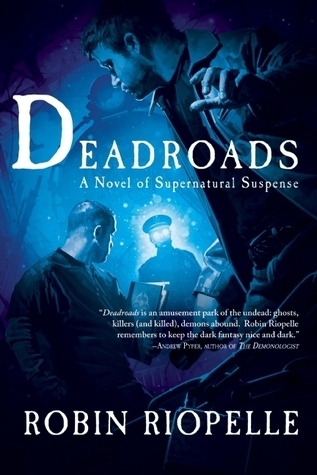
Derek Künsken, Robin Riopelle and I took a detour to retrieve Robin’s new book Deadroads from Fedex purgatory.
It began on the car ride down on Friday with Derek Künsken and Robin Riopelle. Things could have turned ugly when we learned the Robin’s copies of her new book Deadroads—which should have been shipped to her home on Monday—had made it to the FedEx depot near Pearson Airport. But, Fedex would not ship them to the convention hotel. So, we made a detour to the Fedex depot, got lost, found our way, and rescued the books. Rather than get mad, we considered it an adventure.
Friday was dinner, panels and catching up with friends, but capped off by an hour-long live podcast with Adam Shaftoe, Madeline Ashby, Candice Lepage and Nick Montgomery. Despite my Chuck Palahniuk-like rants about Baby Boomers and Steampunk cosplayers, I think we all had a good time. The audience certainly seemed to laugh.
Saturday I did a reading that followed Marie Bilodeau‘s. Marie read from her new novel Destiny’s War and “The Kevlar Canoe” from the Masked Mosiac anthology. Since Marie was bright and bubbly as always, I needed to segue people into my dark fiction. Using my 100-word shocker “The Wall of Gloves” as a palette cleanser, I then read from my short story collection Touch the Sky, Embrace the Dark and my Aurora Award-eligible short story “The Leaving“.

Marie Bilodeau read from Masked Mosiac, a Canadian anthology of superhero stories.
The day passed by attending more panels before sitting on the “Can the Author become the Critic?” and “What makes a Great Villain?” panels.
At 10:30, I read from The Empire Striketh Back on a panel about (bad) fanfic organized by Michael Matheson. There was much laughter as some read their Star Wars/Pacific Rim fanfic mash-ups and some pretty horrifying Harry Potter fanfic.
I spent a good deal of Sunday in the Green Room catching up with friends I don’t get to see that often. I’m especially pleased I got to talk to Derek Newman-Stille, who I met at Can-Con last year, about a number of topics, including the “armour” we introverts put on when speaking in front of groups.
And then it was over all too quickly.
A few things worth mentioning:
ChiZine Publications did not attend this year. After a busy 2013, co-publishers Sandra Kasturi and Brett Savory decided to sit this one out and rest. With most people knowing my involvement with CZP, there were many people asking where they were. I take that as a great sign of what a tent-pole CZP has become in the Toronto specfic community. As Adam Shaftoe put it somewhat facetiously:
It's after midnight and @MattMooreWrites and I still can't find the @chizinepub party.—
Adam Shaftoe (@AdamShaftoe) April 06, 2014
Derek, Marie, Hayden Trenholm and I (all Ottawa writers) did quite a good job of raising awareness for Can-Con, Ottawa’s speculative literature convention in October. A number of Toronto-based writers committed to attending and many more expressed an interest. If you are anywhere near Ottawa, I invite you to come to the capital on October. I know Ottawa has a reputation for not being a fun place, but Can-Con will show you we know how to have a good time.
I posted some pics from the weekend on Instagram.


March 29, 2014
Ad Astra 2014 Schedule

Here’s my schedule for Ad Astra 2014. The convention is using shdlr.com to organize the convention. Check out the Ad Astra shdlr.com calendar.
Friday
11PM: Podcasting After Dark
Main Room (Richmond CD)
Adam Shaftoe, Candice Lepage, Madeline Ashby, Matt Moore
Saturday
1:30PM: Reading
Oakridges
6PM: Can the Author Become the Critic?
Newmarket
Adam Shaftoe, David Lamb, Matt Moore, Patricia Briggs, Rio Youers
9PM: What Makes a Great Villain?
Aurora
Ada Hoffman, Gregory A. Wilson, Matt Moore, Rob St-Martin, Thomas Gofton


March 25, 2014
On the Aurora Awards, My Eligible Story, and Small Town Horror Stories
Nominations are now being accepted for the 2014 Prix Aurora Awards. I’ve posted my short story “The Leaving” for your consideration. You can read it online or download the PDF. Please take a look and, if you like it, consider nominating it in the Best Short Fiction – English category.
My friend Derek Künsken (who reads a lot more short fiction than me) has posted a list of others stories he recommends, including his super-creepy “The Dog’s Paw”.
Instruction for how to nominate a story are available on the Canadian Science Fiction & Fantasy Association’s site.
Why should you nominate me?
I’m making a blatant appeal to horror fans: Horror stories rarely get on the Aurora ballot. Usually, science fiction and fantasy dominate. I have nothing against these genres and write stories in them, but would like to see horror get the attention and recognition it deserves.
Last year, my high-concept mathematics meets Lovecraftian horror mash-up “Delta Pi” was nominated, but “The Leaving” is a straight ahead, go for the throat horror story about a monster in a small town.
Now, you might be thinking “I’ve read a thousand monster in a small town stories. What makes yours different?” At its heart, “The Leaving” is about the secrets small towns keep from those who are “from away” and how that reflects in the secrets we keep from each other. With the fictional setting of Jefferson Hollow undergoing rapid growth due to a highway extension, the influx of newcomers looking for the quiet, small-town life runs headlong into the town’s secret. And just as there’s an influx, there are those locals who can’t wait to put their hometown in their rear view mirror.
Coming from a small town that saw its local mom-and-pop shops driven out of business by Starbucks, Walmart and Big Y—while young people (like me) longed to escape what they saw as a boring place to live—this story sums up my feelings about the rapidly fading cultures and traditions in small towns. There is tension, conflict and resentment in this change. All of these emotions, to me, are more horrifying than the monster in “The Leaving.” For me, that makes a good horror story.
I hope you agree.
What are the Prix Aurora Awards?
The Prix Aurora Awards recognize the best in Canadian science fiction, fantasy and horror. Categores include writing, artwork and fandom. Past winners include Robert J. Sawyer, Peter Watts, Guy Gavriel Kay, my friend Hayden Trenholm and too many more to mention.
Inspired by Tanya Huff, last summer I posted to my blog why we should participate in the Aurora Awards.
What am I hoping to do?
I want to get on the ballot, which is an honour in itself. But that means I need a lot of nominations. Even one nomination can be the difference between getting on the ballot or not. Any Canadian citizen or resident can make a nomination. Even if you’re not a writer or consider yourself a hard-core fan, you can help.


March 6, 2014
An evening with Max Brooks: Zombies, Brad Pitt and being a little bit more heroic
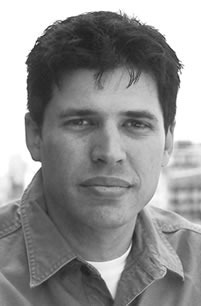
Max Brooks
Last night, I had the pleasure to attend a presentation by Max Brooks, author of The Zombie Survival Guide and World War Z, at the Mayfair Theatre.
The evening began with a presentation by Dr. Robert J. Smith? (the question mark at the end of his name is intentional) from the University of Ottawa. Smith? has applied the mathematics of disease outbreaks to the zombie apocalypse. His results were chilling, with a city the size of Ottawa being overrun within 4-8 days, even if a quarantine procedure were put in place or a cure for the plague were found. The best course of action would be rapid, incremental attacks against the zombies to wear down their numbers while learning effective strategies, making each attack more successful.
What I most enjoyed was Smith?’s ability to present a very simple mathematical formula for the outbreak, then expand upon it as new ideas were introduced. In the end, we were able to follow a very complex methodology. (And, my inner math geek delighted in being back in a more academic world of formulas and models.)
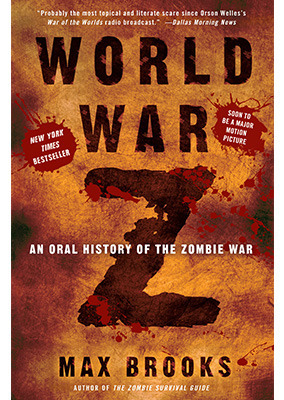
Then Brooks took the stage (who, I hadn’t realized, had been sitting in front of me through most of Smith?’s presentation). With quick whit, he gave a presentation and then a Q&A about what drove him to write The Zombie Survival Guide, advice on dealing with zombies, and the “Brad Pitt-sized elephant in the room” that is the movie version of World War Z.
Brooks showed tremendous grace when it came to the film. He stated that he freely signed away the rights and creative control, so has no right to gripe about the outcome (nor, he pointed out, is he under any obligation to promote or endorse it). He contrasted himself with Alan Moore, who received a much rawer deal when it came to Watchmen.
Yet under Brooks’ humour was a clearly intelligent and contemplative man. The Zombie Survival Guide was his way of exploring a question he posed to himself: how would he survive? And World War Z came from the challenge of figuring out how the world would react to a global outbreak, not just the common plot of following a group of survivors. His creative works were never meant to be bestsellers, but to fulfill his own curiosity.

While Brooks was professional and graceful in discussing the film version of World War Z, one of his issues with the film was the use of a heroic main character. Brooks doesn’t believein heroes that solve things. In real life, we all need to be just a little more heroic.
For example, when it comes to surviving a zombie apocalypse, many react by saying they’d want a gun or big vehicle. Yet Brooks would want a bike and water. A gun will run out of bullets. A car can break down. A bike is simple to repair and carry over rough terrain. And a human can survive for days without a gun; not so without water.
But bottled water is heavy, so one would be better to find a source of fresh, potable water. Yet no doubt others would be searching for one as well, resulting in violent competition and attracting zombies. So to increase the odds of survival, one would need to find a source of water no one would think of or be willing to settle near, meaning more isolated or harsher conditions than most would endure. And to do that takes preparation in the here and now.
How many of us, Brooks asked, are that prepared?
He also showed his knowledge of history and psychology in describing certain elements from his books, especially how the Redeker Plan was based on the psychology of Apartheid-era South Africa and Soviet military tactics in World War II.
What stuck with me most was something Brooks said about how the novel World War Z had no main characters and no miracle cure. He doesn’t believe in either. To solve big problems, we all need to act just a little more heroically. This statement, coupled with Brooks’ declaration that even though he’s been offered money for more commercial projects he’s going to work on the material he loves, had me leaving the Mayfair feeling enthusiastic and buoyed… despite an evening spent hearing how the living dead will consume the world.





